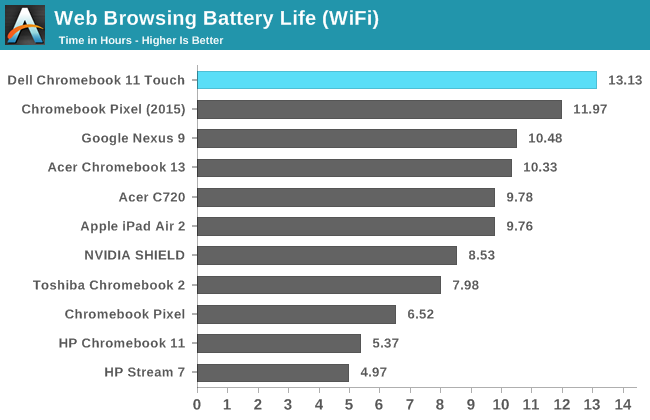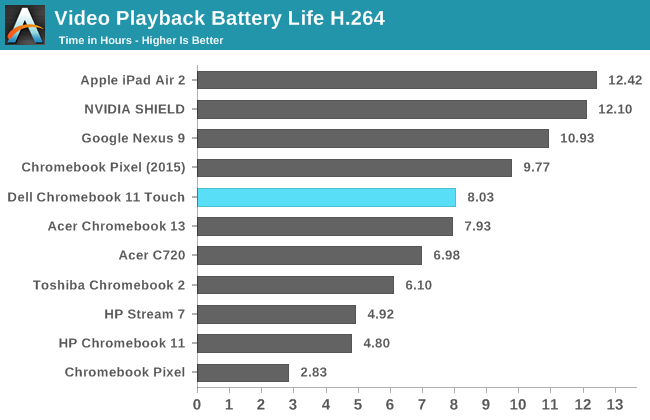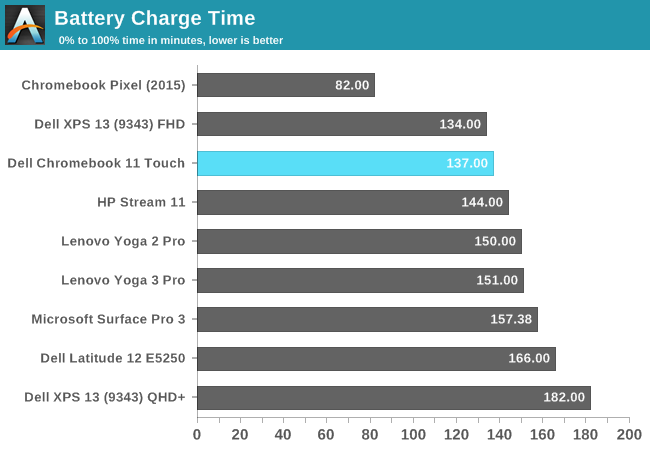The Dell Chromebook 11 Touch Review
by Brandon Chester on May 7, 2015 8:00 AM EST- Posted in
- Laptops
- Chrome OS
- Chromebook
Battery Life
Battery life on Chromebooks is typically very good, as they don't have much going on in the background. I would like to add some WebGL and video playback to our web browsing test in the future, but I still think it's a good representation of the amount of page loading that users do on their Chromebooks. The Dell Chromebook 11 has a 43Wh battery, which is as large as some Chromebooks with 13" displays. One would hope that this results in a substantial battery life, and indeed it does as you can see below.

The Dell Chromebook 11 achieves the highest score on record in our web browsing battery test. At 13.13 hours it pulls ahead of the Chromebook Pixel which I had previously praised for its stellar battery life. A more relevant comparison at this price point is Toshiba's Chromebook 2, which trails the Dell Chromebook 11 by over six hours in this test. The display in the Dell with its lower resolution and smaller gamut definitely plays no small part in this, but for someone concerned primarily with battery life the Dell Chromebook 11 looks like the Chromebook to buy.

While tablets and smartphones tend to achieve longer battery life in our video playback test than our web test, the situation is reversed for Chromebooks. Given that many Chromebooks take advantage of dynamic backlighting and contrast like tablets do, I suspect that the issue comes down to software optimizations. Even so, at 8.03 hours the Dell Chromebook 11's battery life during video playback is still pretty good, and again is ahead of the Toshiba Chromebook 2.
Charge Time
Long charge times have never been much of an issue for laptops, as they've never been limited by many standards for how high the wattage on their chargers can be. Unfortunately the charge time test is another test that I've introduced for our Chromebook reviews, and so the Chromebook Pixel ends up being the only other Chromebook data point. The rest of the results in our chart are for Windows laptops. However, the time to charge for a device is really independent of the operating system, and I'll be adding more Chromebooks to this chart as time goes on.

Dell includes a 65W AC adapter to charge the Chromebook 11's battery, and to charge from a completely empty state to 100% takes around 2.3 hours. It's not as fast as the Chromebook Pixel's charge time, but it's slightly quicker than most of the Windows laptops on the chart.










46 Comments
View All Comments
nikon133 - Sunday, May 10, 2015 - link
Don't be so quick on judging others, you are not 13, I hope... Anyway. I'll take it with your vast knowledge, you are shooting your DSLR in JPG. Personally I think it is a bit of waste, but I'm not judging - see? Being mature. Or are you using something like Polarr on your Chromebook? Presuming that Polarr can to RAW off-line - most hotels I've been in, some Hiltons and Novotels included - had quite abysmal, yet extremely expensive Internet - can you easily export library from your Chromebook and import it in Lightroom with all the edits (you might have done on Chromebook) preserved? Or do you use CB exclusively for all your photo needs?And... you are comparing 2015 Chromebooks with machines introduced in 2007 and not significantly upgraded in their lifetime? That's a bit unrealistic. I said "at least I could dump my photos..." to underline my disagreement with this minimal storage trend on machines that aim to replace traditional laptop for some/many, I didn't say that I would be using netbook today. I did say that for my usage scenario something like 128GB Surface 3 is better, and I think that statement is quite solid. Otherwise, I agree there is no need to drag heavy Windows laptop - that is why we have all sort on ultrabooks, MBAs, convertibles. If I am aware of that, with all my lack of hardware knowledge, you must be too, for sure.
nikon133 - Sunday, May 10, 2015 - link
Nope.I'm a bit of camera freak. I shot in RAW, and my current camera does about 20MB photo size. I usually carry with me two 32GB SD cards, and one 16GB for backup... though so far I never filled up 64GB, but I did come close to that. Realistically, I'm usually between 32 and 48GB of RAM images.
Good luck with that on 16GB storage Chromebook.
Even if I could backup to another SD card via built-in storage... really? Copying 32+ GB to laptop's SSD and then back to another SD card makes more sense than dumping it to laptop's storage and leaving it there? In which universe..?
I don't understand some of you folks. Just because your favourite company made something, suddenly it is perfectly OK do downgrade dramatically and workout some funny workarounds in order to cope with severe limitations. Personally, I'm OK to go down from 500+ GB HDD to 256GB SSD... or even 128GB SSD... but down to 16GB? Where do I put my movies/TV/digital comics I like to carry with me on trips?
Beside all that... I like having Adobe Lightroom on my travel machine, in case I want to export a few photos to JPG, for whatever reason I might have (usually wife wanting to email someone from her vast list of friends and relatives). It doesn't have to be up to speed, just a few photos will get munched even on 4C Atom, as long as it runs Windows (or OSX). On Chromebook, a bit harder.
Finally... both my wife and I need access to MS Office every now and then, even on vacations. Especially her. She is working on local Uni, her group always have a few papers waiting to be published in different scientific magazines, and very often they get returned for some corrections. Being able to open/edit/resend might not be a must - in most cases it can wait until we are back - but bonus it sure is.
And really... "hot and heavy Windows laptop with a short battery life"? With abundance of ultrabooks and tablets with decent battery life, low weight and good performance, that really isn't argument anymore. Even my wife's 2011 13" Vaio S could run 6 hours and carried i3, 4GB RAM /500GB HDD and was something around 1.4KG without extended battery. Yes, there is a price-tag... but if cheap machine doesn't do the job for me, I'll pay it gladly.
Don't judge everyone by your usage scenarios. If Chromebook does indeed work for you, well, power to you; and savings. But one shoe doesn't fit all. Never did, never will. I didn't say that my reasoning is universal, but it is my reasoning.
jabber - Monday, May 11, 2015 - link
You do know that no one really wants to see your holiday pics whether shot in JPEG or converted and edited from RAW? They really don't. If they do they are just being polite.You are putting in too much effort for an audience that isn't there.
nikon133 - Monday, May 11, 2015 - link
Well... let's put it this way.No one wants to watch me playing games - and I'm still playing them.
No one wants to watch me watching Game of Thrones, but what do you know - I still watch it.
There are things I do for myself, because I'm enjoying them, not because I want to impress anyone. Photos are my hobby, and I'm getting a blast from making and editing them. Effort I'm putting in is something that relaxes me, so the most important audience - myself - is there. It also gives me reason to be active and spend more time outdoors - and God knows, working in the office, driving car to and from work and spending additional time behind gaming machine(s), I could use much more outdoor time than what I'm giving myself :)
I'm never showing my photos to anyone by default, if anyone asks to see my last travel/vacation, they get a link to small gallery of 20-30 selected photos (out of 1000+) sitting on OneDrive or FB.
I don't really do vacation photos - as in, me and my family on the beach. My wife does a lot of conferences and visits/co-ops with Universities around the world, and I travel with her whenever I can. Places like Prague, Budapest, Mainz, Lyon... are great opportunities for camera action, and decent modern DSLR really gives great tools to play with... RAW being one of them. Having DSLR and not using RAW is a criminal act, really ;)
nikon133 - Monday, May 11, 2015 - link
And all that being said, fact remains that laptop with 16GB of storage just doesn't hold water for me. Back in early 2000, my Toshiba Satellite 1000 had 15GB HDD, and it was barely enough... but that was back then. My main camera was film, my digital camera was 2MP Canon A40, and everything else digital was much smaller than today.Today, a decent Android tablet - or even iPad - with keyboard dock and access to large apps library would probably be much better travel companion to me. With additional benefit of being convertible.
der - Thursday, May 7, 2015 - link
Dell swagbook 11.der - Thursday, May 7, 2015 - link
The Toshiba one even can go over 1080p as max resolution, something like 2048 by 1152. It-s a win-win!Uplink10 - Thursday, May 7, 2015 - link
"Starting at $249 for 2GB of RAM"You can get a Baytrail laptop for that price or similar with 4GB of RAM, 500 GB HDD, better BIOS/UEFI... Can you even reinstall OS (install proper Linux) or upgrade hardware or disable/enable devices like in a normal computer in a normal BIOS/UEFI?
SM123456 - Thursday, May 7, 2015 - link
That must be Canadian dollars - Chromebooks with that spec are $179 now.As far as Windows machines like the HP Stream 11 are concerned, they are half the speed as identically spec'ed Chromebooks according to independent benchmarks like Kraken and Octane, which measure all round browser performance - and that is just running a browser. Running legacy Windows applications on Windows netbook class devices like the HP Stream 11 will be a whoile lot slower. It is all down to the full fat bloated nature of the Windows OS compared to the lean mean ChromeOS - shoehorning Windows into these low spec devices makes for a painfully slow experience, whereas ChromeOS is fast and responsive because it uses a server in the cloud to do the heavy lifting, and the local OS is very lightweight.
By the way, here is a Chromebook "running" Adobe Premiere Pro, Photoshop cc, Excel, AutoDesk 3DS Max, AutoCAD 3D, and SolidWorks on a server faster and smoother than a hot and heavy $1700 high end CAD laptop with a 2.5 hour battery life can manage, and still do it with 11 hours battery life.
https://www.youtube.com/watch?v=RbP5jsoyxOY
Uplink10 - Thursday, May 7, 2015 - link
That Chromebook is runing a client which is connected to a Virtual Machine, meaning it is not actually doing anything other than displaying screen of VM, of course it is fast if processing is not done on a Chromebook but in a VM somwhere else, performance needed is the same as displaying a video or runing RDP or VNC client. Where did you get the idea Chromebook is faster than a $1700 workstation?